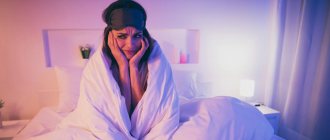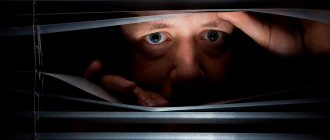What is insomnia
Insomnia, or in medical language - insomnia, is considered to be any deviation from normal sleep. Frequent awakenings in the middle of the night, prolonged (up to several hours) falling asleep and difficult awakenings, prolonged absence of sleep at night, shallow sleep - all this is considered to be manifestations of insomnia. Everyone has had periods in their life when they experienced the effects of insomnia on themselves. She especially likes to come before an important event, on the eve of a celebration or exam, when a person is making an important decision in life, to young mothers who hear the slightest rustle of the baby.
More often than not, insomnia is a byproduct of our nervous system, which is known to be unstable, especially in today's pace and lifestyle. The disease can have several types of manifestation.
Presomnia type of disorder
Characterized by prolonged falling asleep. At this time, a person experiences a physical need for rest, feels the desire to fall asleep, but cannot do this. The norm for falling asleep is 5-15 minutes. If after this time sleep has not occurred, we can talk about manifestations of insomnia. This is usually associated with neuropsychological disorders and occurs on the eve of exciting events or after important events. It occurs very often and usually goes away on its own as the emotional state improves.
Intrasomnic disorders
With this type of insomnia, sudden awakenings at night occur, followed by difficulty falling asleep or a complete lack of further sleep. This type of disorder makes sleep superficial, reminiscent of a normal nap and sensitive, when the sleeper is able to wake up from the slightest rustle. Insomnia in this case is caused by emotional swings, experiencing unpleasant events, mental disorders, sleep apnea and self-snoring, systemic diseases (thyroid gland, diabetes mellitus).
Postsomnia disorders
This type is even more common than the first. Its main symptom is a lack of strength and desire to open your eyes, a long awakening, weakness and fatigue even after a whole night of restful sleep. A person suffering from this type of insomnia feels drowsy throughout the day and fails when trying to replenish energy and fall asleep. In addition to psychological reasons, in this case there may be a deficiency of vitamins and minerals, late going to bed, blues and emotional stress. Usually, with this disorder, a person easily falls asleep and sleeps soundly at night, but waking up in the morning causes negative emotions and physical impotence.
But before diagnosing insomnia, it is worth assessing your habits, current state of affairs, and emotional state. Often the reason may lie on the surface.
Take up sleep monitoring
First, it's important to understand what's wrong with your sleep. Sleep monitoring will help with this. Thanks to monitoring, you can find out whether you have problems falling asleep, whether you wake up in the middle of the night, or whether you sleep lightly.
If you are very serious, you can sign up for a study in a special sleep laboratory and consult a somnologist. Polysomnography is the gold standard for identifying sleep disorders. Doctors use tests like these to diagnose restless leg syndrome, sleep apnea, insomnia and other conditions.
However, today there are many cheaper and smaller devices that can help with sleep monitoring. If you have a smartwatch, special apps can track your sleep patterns based on your heart rate. The watch can also record sounds, which can help detect snoring or external stimuli that are preventing you from sleeping deeply. For example, loud noises from the street early in the morning. Conducting such a “research” is much easier, but its accuracy will be much lower.
Please note ☝ There is varying evidence regarding the effectiveness of sleep monitoring apps. Some studies suggest that the readings from smart watches and trackers are quite reliable. Other studies indicate that such devices often overestimate sleep duration. There is also evidence that for some people, smart watches and similar gadgets can cause additional anxiety, which impairs sleep.
Causes of insomnia
Psycho-social stress. For example, this happens due to excessive anxiety about money and work, illness of children and loved ones. When crises happen in your personal life and you conduct an internal dialogue, bringing to perfection what you haven’t done in reality.
Depression
of a different nature, a state of blues and anxiety;
Increased brain activity
and emotional overarousal, both positive and negative. This often happens during sessions, before and after important business meetings, before trips and vacations, during periods of intense activity and multitasking. elderly age;
Discomfort
both mental and physical, the influence of extraneous sounds, light, noise. Darkness is one of the main conditions under which the sleep hormone melatonin is produced in sufficient quantities. The slightest lighting, watching TV or a phone monitor before bed can affect the quality of melatonin production and disrupt sleep. Often the cause of poor sleep can be discomfort caused by bedding - an uncomfortable pillow, too hard, too soft, uneven mattress. In this case, solving the problem becomes less problematic;
Non-compliance with the regime
day and biorhythms. For example, a shift work schedule, frequent time zone changes. This often happens with simple night owls, the so-called “night owls,” whose peak activity occurs in the afternoon and evening. It is difficult for them to go to bed on time, it is difficult for them to fall asleep and wake up at the appointed early hour, because a lot of time, energy and effort have been spent trying to sleep;
Alcohol
and caffeinated drinks. They also cause sleep disturbances. Especially if drinking such drinks happened in the evening. Needless to say how harmful they are for healthy sleep. Alcohol is wrongly considered by some to be a sedative and hypnotic. While it may actually make it easier to fall asleep, the quality of your sleep will suffer significantly. And all because alcohol inhibits the REM sleep phase. The same one during which the body’s strength is restored, when we dream and our brain organizes the information received. In addition, alcohol and caffeine can put a strain on the cardiovascular system, provoke snoring and sleep apnea, which act like a time bomb on the body, provoking both mental and functional disorders;
Apnea
- breathing disorders that can occur under the influence of substances, or due to the structural features of the nasopharynx, when obstacles appear in the air path in the form of a sticky palate and uvula, a deviated nasal septum, adenoids, cysts, allergies or a runny nose.
Taking medications (sympathomimetics, anorectics), drugs. Carefully read the instructions for any medications you take. One of the side effects may be increased excitability. It is for this reason that drugs such as echinacea, ginseng and many other adaptogens are not recommended to be taken in the afternoon, but rather from morning until lunch. Diseases and disorders.
Infectious and colds, fever, itchy skin and pain of various locations and origins;
Endocrine diseases
accompanied by hypoglycemia, frequent urination, dry mouth. Do you drink a glass of water before bed? Do you wake up to drink or from feeling hungry? It's time to change something;
Neurological diseases
such as dementia, Parkinson's disease, traumatic brain injury, neuroses or schizophrenia.
How to fall asleep quickly if you can't sleep
Each of us, at least once in our lives, wondered what to do to force ourselves to fall asleep when necessary, and not when the body turns off by itself from fatigue. In fact, not everyone can fall asleep easily. To understand what to do to fall asleep quickly, you need to have at least a minimal understanding of sleep and its stages.
Then, the problem called “I can’t sleep” can be avoided. So, sleep is nothing more than a physiological state that is inherent not only to humans, but also to other mammals, fish, birds and even insects. When we sleep, our reactions to what is happening around us slow down.
Normal physiological sleep differs from similar states, for example, fainting, lethargic sleep, coma , hibernation or suspended animation in animals in that it:
- repeats every day, i.e. 24 hours (sleeping at night is considered normal);
- characterized by the presence of a period of falling asleep or drowsiness ;
- has several stages.
brain activity decreases and your heart rate . A person yawns, the sensitive sensory systems also decrease, and secretory activity slows down, which is why our eyes stick together.
During the night we go through the following stages of sleep:
- slow wave sleep occurs immediately after a person falls asleep. During this period, muscle activity decreases, and we feel pleasant relaxation. Due to the slowdown of all vital processes, a person falls asleep and falls asleep soundly. There are three main stages in the slow-wave sleep phase: the actual stage of falling asleep or dozing, which lasts no more than 10 minutes, the stage of light sleep, in which auditory sensitivity is still preserved and the person is easy to wake up, for example, by a loud sound, and also the stage of slow-wave sleep, t .e. prolonged deep and sound sleep with dreams;
- REM sleep lasts a maximum of 15 minutes. Although it is a separate period of sleep, researchers often refer to REM sleep as another stage of slow-wave sleep. It is in these last minutes before waking up that our brain “wakes up”, i.e. completely restores its activity and removes the human body from the land of dreams and dreams. Thus, acting as a psychological defense during the transition from the world of the subconscious to reality. During REM sleep, blood flow in the brain and heart rate increase, the production of adrenal hormones increases, pressure surges and changes in respiratory rhythm may be observed.
Sleep performs a number of important functions in the human body. Firstly, it provides complete rest. After all, there is nothing better than sleeping after a hard day of work, no matter whether you were engaged in mental or physical work. Sleep restores strength and energizes you for a new day.
During sleep, our brain processes information received during the day, evaluates and experiences events that happened to a person. Good sleep is important for the immune system. Sleep disturbances have a painful impact on a person’s health; constant lack of sleep, coupled with nervousness, causes irreparable harm and weakens the immune system .
Scientists believe that sleep is a natural mechanism for the body to adapt to changes in light levels. Historically, most people sleep at night, however, there is also a daytime nap, the so-called siesta. In hot southern countries, it is customary to get up at dawn and rest in the afternoon, when the sun is at its zenith and doing anything outside is simply impossible due to the sweltering heat.
The duration of sleep depends on many factors, for example, the person’s age, his lifestyle and the degree of fatigue. Young children sleep the most, and older people tend to get up with the roosters. It is believed that healthy sleep should last at least 8 hours, and the minimum for normal well-being is 6 hours. If sleep duration is reduced to 5 hours or less, then there is a risk of developing insomnia .
I can’t sleep, what should I do?
Why can't I sleep? We all asked ourselves this question when we couldn’t fall asleep for a long time, tossing and turning in bed. So, if I want to sleep and cannot sleep, then the reason for this may be:
- disturbances in wakefulness and sleep. This condition is often characteristic of newborn children who get enough sleep during the day and then do not want to sleep at night. Then they say that the baby confused day with night. The same thing can happen to adults, for example, if a person works in shifts or often flies by plane to other cities and countries, and his body experiences stress from changing time zones. In addition, we often simply do not want to go to bed on time on the weekend (“weekend insomnia”), which leads to a shift in schedule and lack of sleep on Monday;
- uncomfortable place to sleep, as well as unsuitable bedding. Many people waste their money on bedding, a comfortable orthopedic mattress and a suitable bed, believing that this does not play an important role in the sleep process, they say, if you want to sleep, then you will fall asleep on the bare ground. Of course, there is a grain of truth in this statement, but not everything is so simple. The quality of sleep, as well as its duration, plays a decisive role in a person’s well-being. It’s one thing to sleep, tossing and turning on an uncomfortable bed for 12 hours, and another to actually rest on a comfortable mattress, with a comfortable pillow and bed linen in a well-ventilated room;
- bad habits that damage the entire body as a whole and have a negative impact on the period of falling asleep, as well as the duration and quality of sleep. For example, smoking before bed interferes with relaxation because nicotine constricts blood vessels;
- diseases and sleep pathologies. Many diseases in which a person suffers from pain interfere with normal sleep. As a rule, the peak of pain occurs in the evening or at night, which prevents falling asleep.
The main sleep disorders include:
- insomnia ( insomnia ) is a condition in which a person cannot fall asleep or sleeps little and of poor quality;
- hypersomnia ( pathological drowsiness ) is the opposite of insomnia, in which a person, on the contrary, wants to sleep all the time;
- apnea ( snoring ) is a breathing disorder during sleep;
- Sleep paralysis is a condition in which a person's muscles become paralyzed before falling asleep;
- parasomnia, i.e. a condition caused by nervous overstrain or stress, in which a person may sleepwalk, suffer from sleepwalking , have epileptic seizures , or suffer from persistent nightmares.
Consequences of insomnia
Before taking action, it is important to assess the scale of the disaster. Lack of quality sleep and the slightest disturbance lasting from a week to 10 days is not a reason to panic. The episodic nature of disorders of varying sleep duration occurs in everyone. But serious disorders that torment for months become chronic and have consequences.
- Problems concentrating,
- Difficulties with remembering and learning,
- Decreased performance
- Apathy or obsessiveness
- Development of depressive states
- Loss of interest in life
- Irritability and aggression
- Manifestation of somatic diseases
- Chronic fatigue
- Arterial pressure
- Headache
- Disorders of the cardiovascular system
- Excess weight
- Edema
- Deterioration in skin quality and overall appearance
And this is only a small part of the consequences of insomnia, which can be avoided by starting insomnia therapy or its prevention in time. The best remedies for insomnia
On a note
Lack of sleep is harmful to health: it increases the risk of obesity, diabetes, cardiovascular diseases and cancer, affects mental health, and reduces life expectancy.
Sleep is necessary for the restoration of the body and its normal functioning. When we sleep poorly, our productivity, ability to concentrate and learn decrease, memory and mood deteriorate.
To improve your sleep, you need:
- Avoid gadgets 1-2 hours before bedtime.
- Maintain an optimal temperature in the bedroom.
- Go to bed and wake up at the same time every day.
- Don't forget about physical activity.
- Reduce the amount of alcohol and nicotine before bed, and also avoid a heavy dinner a couple of hours before bedtime.
Warning☝ This article is for educational and informational purposes only and should not be used for diagnosis or treatment, or as a substitute for professional advice.
The best remedies for insomnia
Medicines
Melaxen
A synthetic analogue of the hormone melatonin, responsible for sleep. The drug quickly normalizes and correctly regulates biorhythms. Increases the depth and quality of sleep, eliminates periodic night awakenings. After a night with Melaxen, the feeling of weakness disappears, lethargy and fatigue disappear, dreams become bright and rich. Also suitable as an adaptogen when changing time zones. Reduces negative reactions to stress. Does not cause dependence or addiction.
Recommended course as a sleeping pill: 1 tablet 1 time per day before bedtime. As an adaptogen: the day before the expected departure and for 2-3 days after changing the time zone before bed.
Mälarena
The drug is an analogue of Melaxen. Also indicated for circadian rhythm disorders: flights with changes in time zones, violation of the daily routine, including shift work schedule. Helps eliminate weather dependence syndrome, fatigue, insomnia in older people, and reduces depressive syndrome.
Recommended course: For insomnia and sleep disorders, 1 tablet once a day, 30 minutes before bedtime. The duration of taking the drug is from 1.5 to 2 months. When changing time zones the day before departure and for 2-5 days after, 1 tablet 1 time per day before bed.
Melarithm
The effect on the body is similar to previous drugs. Normalizes circadian rhythms; Makes sleep deep and of high quality, eliminates night awakenings and promotes rapid fall asleep. But in addition to regulating sleep, melarhythm helps improve well-being, mood, and eliminates lethargy and morning drowsiness. It has a pronounced immunostimulating and antioxidant effect.
Recommended course: 1.5–3 mg 30 minutes before bedtime, 1 time per day. Duration of admission is no more than 7 days.
Herbal preparations
Nervochel
A homeopathic medicine designed to reduce increased nervous excitability and normalize sleep. Used for neuroses and menopause in women. Eliminates symptoms of depression and blues, VSD.
Recommended course: 2-3 weeks,
dissolve 1 tablet under the tongue 3 times a day 30 minutes before meals or 1 hour after meals.
Motherwort forte Evalar
Motherwort has a pronounced calming effect, strengthens the nerves, and puts the cardiovascular system in order. The advantage of the drug is that it additionally contains magnesium, and as is known, this microelement plays a key role in the functioning of the nervous system and eliminates muscle excitability. In combination with vitamin B6, which is the main link in the functioning of the nervous system, magnesium is better absorbed by the body. The drug performs a complex effect - it normalizes the emotional state, relieving anxiety and aggression, and at the same time improves sleep.
Recommended course: 3-4 times a day, 1 tablet for 3-6 weeks.
Novo-passit
Completely herbal preparation. Recommended for neurasthenia, increased anxiety, emotional instability, aggressiveness and irritation. Helps overcome fears, eliminate distraction and fatigue. Helps cope with headaches and mild forms of insomnia and periodic sleep disorders associated with psychological tension and stress. The advantage is that it is acceptable for children over 12 years of age.
Recommended course: 5 ml 3 times a day before meals with the prospect of increasing the dose to 10 ml per dose. If severe fatigue or depression occurs, it is necessary to reduce the morning and daily dose by 2 times and take 2.5 ml in the morning and afternoon and 5 ml in the evening. The interval between doses of the medicine should be 4-6 hours.
Knightwell
An excellent and effective drug, with many positive reviews. The herbal composition is enhanced with Magnesium and vitamin B6. Includes mechanisms that are responsible for maintaining normal sleep and deep sleep. Waking up in the morning becomes comfortable, light, without feeling groggy and tired. In addition, Nightwell promotes better concentration, memory and performance, because Magnesium in combination with vitamin B6 has a beneficial effect on the nervous system.
Recommended course: just 1 capsule before bedtime. Duration of treatment is 3 weeks.
How to fall asleep very quickly
So, how to fall asleep if you don’t want to sleep, and you need to get up early tomorrow. There are several basic methods or techniques for falling asleep quickly that will help you fall asleep soundly in a short time. However, the main principle of all these methods is to maintain a sleep schedule. In addition, it is also important whether a person adheres to the basic rules of a healthy lifestyle or not.
Often, patients who ask a doctor about how to quickly fall asleep if they don’t feel sleepy expect the doctor to prescribe them magic sleeping pills.
However, not every person is suitable for medicinal options for solving sleep problems. In addition, a good specialist will not rush to prescribe medications until he has determined the cause of the ailment and collected a complete medical history of the patient.
Sleeping pills are a broad group of medications that are used both to regulate sleep and to provide anesthesia during surgery. Archaeologists believe that natural sleeping pills, such as plants such as Belladonna or Belladonna, were used by people two thousand years ago.
Egyptian manuscripts indicate that doctors prescribed opium to their patients as a remedy for insomnia . Alcohol was used as a sleeping pill and the simplest method of anesthesia by the American Indians about a thousand years ago.
The first medical anesthesia was invented in Germany at the turn of the 19th century. True, it included toxic and narcotic compounds ( opium , datura herb , mandrake root , aconite , hashish and others), which, although they put the patient into sleep, at the same time had a negative and sometimes fatal effect on his body impact.
Nowadays, sleeping pills and drugs approved for use in anesthesiology have moved to a qualitatively new level. They are much safer for humans (if used wisely, they do not cause physiological or psychological addiction, and are practically free of side effects). In addition, their composition is no longer toxic or poisonous.
However, the principle of the effect of such drugs on the body remains the same. Sleeping pills reduce the level of excitability of the nervous system, thus ensuring sound sleep. It is worth noting that drugs based on barbituric acid ( Pentothal , Phenobarbital , Thiopental , Amobarbital ), which for decades have been the most popular sleeping pills, are now being widely replaced by new generation drugs, for example, cyclopyrrolon or melatonin .
The latter, in turn, is considered an advanced discovery of modern medicine. Melatonin is nothing more than a hormone that is produced by the human body to regulate circadian rhythms. In simple terms, this connection is responsible for our internal clock, which tells us when to sleep and when to stay awake.
The main problem of modern humanity is the level of illumination in our megacities. With the discovery of electricity, daylight hours became significantly longer. After all, now even at night you can turn on the light and it will be almost the same as during the day. Due to a radical change in the rhythm of a person’s life, the level of melatonin is reduced, which inevitably leads to problems with sleep.
Therefore, doctors recommend taking melatonin- to stimulate the process of falling asleep. This is especially true for people who work shifts or fly frequently. Both of them experience a malfunction of their “internal clock,” which melatonin helps adjust. In addition, researchers attribute antioxidant, antitumor, anti-stress, and immunostimulating properties to hormone
Despite their many benefits, sleeping pills are a double-edged sword. On the one hand, drugs in this group help a person to improve sleep, but on the other hand, they can have a detrimental effect on health and be addictive. Therefore, you should always remember the danger of developing dependence on sleeping pills, which will only add to a person’s problems.
People often need help restoring sleep after stress, which can arise for a variety of reasons. Psychological trauma, recent surgery, illness, as well as moving or changing jobs are stressful for the body, and, consequently, for all its systems. In stressful situations, our body defends itself and produces so-called “ stress hormones ” - adrenaline, cortisol and prolactin .
In response to the action of hormones, the human body begins to work in a different “emergency” mode, preparing for active actions. Therefore, we feel out of place, nervous and anxious. Stress hormones cause the heart to beat faster, which affects blood pressure levels, the respiratory system and, of course, sleep.
Fear and uncertainty make it difficult to fall asleep, and in addition to stress, a person gets another problem - insomnia . Therefore, it is important to know how to overcome stress so that it does not affect other areas of a person’s life. Experts advise solving all your problems before evening and not “bringing” them home, where an atmosphere of calm and safety should reign.
Often people themselves provoke insomnia by very much wanting to fall asleep before some important event or trip, thus irritating their nervous system and provoking stress. It is believed that in such cases you should not force yourself and escalate the situation even more. It's better to get out of bed and do something useful or distracting, such as get some fresh air or walk your pet.
“I wake up at night and can’t sleep soundly” - many doctors have heard this phrase from their patients. And each of us, at least once in our lives, has wondered how to quickly fall asleep at night if you can’t. You can wake up from a sharp sound, a touch, a nightmare, or an insect bite. It happens that we wake up for no reason in the middle of the night and then, trying to fall asleep faster, we get nervous and angry.
In fact, this is another example of a stressful situation that can only be resolved in one way - by calming down. Of course, if your doctor has prescribed sleeping pills for you, then you can resort to their help, but there are other safer, albeit not so fast-acting, options.
To begin with, it is better to seek help from specialists, especially if you cannot sleep at night without constantly waking up after a certain period of time. Such disturbing sleep or its complete absence can signal various malfunctions in the normal functioning of the human body. A somnologist will help answer the question of why the patient cannot fall asleep at night and what to do in such a situation.
In addition to sleeping pills, sleep problems are solved by antidepressants , herbal sedatives or anti-anxiety medications. The above medications cause drowsiness and calm, thus helping a person to relax and immerse themselves in the “kingdom of Morpheus”.
The most common drugs used to solve sleep problems are:
- Novo-Passit is a combination drug that contains medicinal herbs and the hormone guaifenzine . It helps improve the functioning of the nervous system and cure insomnia;
- Phytosed - this sedative drug facilitates and significantly speeds up the process of falling asleep;
- Corvalol, Valocordin, Valerian tincture are plant-based drops that help to calm down and fall asleep;
- Motherwort Forte - this drug contains magnesium (the lack of which in the body aggravates sleep problems), as well as B ;
- Melatonin is a drug that contains the hormone , produced by the human body and responsible for the functioning of the “internal clock”.
In addition to drug treatment, sleep problems can be corrected using procedures such as acupuncture, hypnosis, meditation, homeopathy, electrosonotherapy (pulsed current) and others.
How to fall asleep in 5 minutes
How to quickly fall asleep in 5 minutes? And in general, is there any universal method that will allow anyone to fall into a sound sleep in a matter of minutes? According to Dr. Andrew Weil, who studies the effects of stress on the human body and ways to deal with it, he was able to find the answer to the question of how to fall asleep in 5 minutes.
The thing is that the main reason that a healthy person cannot fall asleep normally is chronic fatigue and tension. When we go to bed, we think about what happened during the day, experience some events, analyze them, or worry about what we will experience tomorrow. As a result, we “wind up” ourselves, which leads to the production of “stress hormones”, and sleep does not come.
Based on this, the scientist concludes that there is nothing better than breathing exercises or meditation before bed. These techniques will help you calm down and get into a positive mood. In order to fall asleep quickly, Dr. Weil suggests using a breathing technique called “ 4-7-8 trick ” which is successfully used by monks and yogis in their daily practice.
So, following this technique, you need to act in the following sequence:
- First, you should inhale deeply through your nose for 4 seconds, trying to relax;
- then hold your breath for about 7 seconds;
- and then exhale for 8 seconds.
Another breathing technique that helps you fall asleep involves the following scheme of actions:
- you need to inhale slowly for 5 seconds;
- then take a 5 second break;
- and finally exhale for 5 seconds.
Counted breathing also helps you become drowsy and fall asleep quickly. This method involves counting inhalations and exhalations. You need to breathe through your mouth and count like this: inhale one, exhale two, inhale three, exhale four, and so on until ten. Then the cycle repeats again. When performing this technique, experts advise concentrating on breathing and, as it were, passing through your own lungs with the air.
Practicing psychologists advise their patients to exercise such as Carousel to calm and relax. Take a horizontal position, lie down comfortably and relax. Do not press your lower and upper limbs against your body. Start with a calm, normal inhalation and imagine that a stream of warm air is passing through your right ear, hold your breath.
Breathing exercises or meditation are helpful for insomnia
Next, as you exhale, the warm air follows through the shoulder of your right arm, and then the hand. Finally, pause. Then inhale and again imagine that the air is passing through your right ear. Hold your breath. You exhale air and “send” it to the thigh of your lower leg and to your foot. You pause.
Again, “inhale” through your right ear and hold your breath, and then, as you exhale, “send” air to the thigh and foot of your left leg, pause. Inhale, sending a stream of air over your right shoulder, and hold your breath. As you exhale, the air flow should “pass” the shoulder and hand of the left hand. You pause and then take a deep breath one last time. Hold your breath, and as you exhale, let the air pass through your left ear.
The second circle or cycle should begin with a sigh through the left ear, followed by a pause. Exhale through your left shoulder, arm and hand. Next, take a deep breath and pause, and exhale through the thigh and foot of the left leg. After a pause, inhale and hold your breath, and exhale through the thigh and foot of your right leg.
After a pause, inhale through your left ear, hold your breath and exhale through your right hand. You pause and again draw in lungs full of air, hold your breath and complete the cycle by exhaling through your right ear.
As a result, in one cycle you take 5 inhalations and the same number of exhalations. During this time, you should relax and fully concentrate on the flow of air that passes through your body. The main thing to remember is that it is when you exhale that the body relaxes the most. Therefore, in any breathing practice, the exhalation phase occupies a decisive place.
“Special Services” technique that takes into account the physiological aspects of sleep. According to this method, you need to sit comfortably in bed, relax and close your eyes, rolling them up under your eyelids. During sleep, the eyeballs are positioned this way, so this method helps you fall asleep quickly.
Using the “Reverse Blinking” technique, a person must take a comfortable position, close his eyelids and, at certain intervals, open and then close his eyes. This is blinking in reverse. As a result, brain activity decreases, the body relaxes, and the person falls asleep.
In addition to the above techniques, you can use such auxiliary means as:
- herbal tea or warm milk with honey;
- dill infusion;
- self-massage of the forehead in the area between the eyebrows, massaging the ears, as well as the inside of the wrists;
- relaxing exercises, for example, “Beach” auto-training, when a person imagines that he is lying on the warm sea coast and hears the soothing sound of the sea, or “ Ball ” , when he needs to imagine a large ball swinging on the waves.
Listed below are several universal recommendations that will help improve sleep:
- Plan your day. Compliance with the regime helps the body get used to a certain rhythm of life. Researchers have found that the human body is knocked out of its usual rhythm in just a couple of days. Therefore, it can be really difficult to recover from several sleepless nights and go to bed on time. It is believed that for normal well-being, an adult should sleep at least eight hours a day. True, the body of each of us is unique, so some people need more rest, while for others, sleeping for six hours will be enough to stay alert.
- Daytime naps not only benefit children, but also help adults feel refreshed and energized in the middle of the day. True, it is important to observe moderation here. Because after sleeping for a couple of hours during the day, you are unlikely to be able to fall asleep easily in the evening. Therefore, some experts do not recommend that people who have problems falling asleep rest during the day; the best way for them to accumulate fatigue until the evening. Another thing is shift workers, for whom napping during the day is considered the norm, because... they work at night and rest during the day.
- When changing time zones, it can be very difficult to fall asleep, because not only a person’s daily routine is disrupted, but also his usual time of wakefulness and sleep changes. When you fly to the west, the first day in a new place after your morning arrival is longer, so in order to sleep well, you just need to wait until the evening. With flights to the east, things are more complicated, so you can resort to the help of melatonin , which will help adjust a person’s internal clock.
- Physical activity is good for the body, but it should end at least 2-3 hours before bedtime. Otherwise, an overly excited body will not be able to fall asleep. Sports such as aerobics, running, skiing, Nordic walking, elliptical, swimming and cycling help improve sleep.
- Not only the daily routine, but also proper nutrition play an important role in the process of establishing sleep. The last meal should be at least 2-3 hours before bedtime. In addition, you should carefully choose the dishes to cook for dinner. You should avoid heavy and slowly digestible foods. It is better to give preference to protein products, for example, fish, lean meat, cottage cheese, yogurt, and some fruits.
- Caffeine is the enemy of sound sleep, especially if you like to consume drinks or foods containing this compound in the afternoon. Also, you should not overindulge in chocolate in the evening, this way you will save your figure and be able to fall asleep quickly.
- Of particular importance for falling asleep easily is the activity or physical activity that a person engages in immediately 2-3 hours before bedtime. It is believed that to avoid sleep problems, you should avoid watching TV, using a computer, phones or other gadgets before falling asleep. In addition, you should not perform complex calculations or solve logic problems before going to bed. All of the above actions do not promote relaxation and calm, but rather excite the nervous system, preventing you from falling asleep peacefully. In the evening, it is recommended to read in bed or take a relaxing bath, and it is better to leave vigorous activity for the morning.
How to get rid of insomnia
Any changes in life require time and effort. Internal effort and a real desire to change the situation for the better. To get rid of insomnia, you will have to reconsider your lifestyle, first of all, paying special attention to four pillars:
- Sleep hygiene.
This is not only water procedures and ritual teeth cleaning. Sleep hygiene is a broad concept. Stop eating and drinking at least 3 hours before bedtime; in the evening, try to use dim lighting; Avoid reading books, scrolling through social media feeds immediately before bed, and do not fall asleep with the TV on; At night, turn off electrical appliances in the bedroom, if any, turn off the sound and Internet on your smartphone; - Control of emotions.
Nerves are the main cause of all human troubles and joys. Like any instrument, nerves need tuning, prevention, cleaning and strengthening. It is important not only to make daily efforts to maintain your emotional state, but also to regularly support the nervous system with vitamins. Moreover, change your attitude towards yourself by starting to observe sleep hygiene - go to bed early, ventilate the bedroom, learn how to relax before bed, so that internal dialogues do not arise in your head as a consequence of the day. - Diet.
We are what we eat. The statement is absolutely true in matters of combating insomnia. Fatty, spicy, salty foods, fast food and abuse of sugar, sweet and alcoholic drinks can have such a strong impact on the body that insomnia very quickly comes to such belly celebrations. It is better to include pumpkin and pumpkin seeds, sesame seeds, spinach, cottage cheese in your diet - such food contains amino acids and microelements that have a beneficial effect on the nervous system, and therefore on the quality of sleep. - Taking care of your health.
Physical activity, sports and general activity help the body to be in good shape, which means maintaining the level of serotonin and endorphins in sufficient quantities so that the nervous system feels good. This means your sleep will be of high quality, calm and complete. But, doing physical exercise before bed is not the best idea, because at this moment the nervous system comes into a state of excitement. In the evening, breathing practices and yoga are best.
Stick to a Schedule
The circadian rhythm, also known as the internal body clock, influences your sleep and wake schedule. Ideally, we should feel most alert early in the morning and ready for bed when it gets dark. The circadian rhythm is affected by unstable sleep patterns, time zone changes, irregular work schedules and overwork.
How can the situation be improved:
- Go to bed and wake up at the same time every day. For children, you need to establish a daily routine and bedtime. Don't use your child's bedroom as a place for time-outs or punishment.
- Try to stick to the same sleep schedule on weekdays and weekends.
- It is worth giving up a heavy dinner a couple of hours before bedtime (snacks are possible), as well as alcohol and nicotine.
- If possible, try to walk every day and be physically active in general.










